Trending Assets
Top investors this month
Trending Assets
Top investors this month
Dear Ray Dalio, China Won't Become a Superpower
Last year, on March 2, 2022, Ray Dalio published a video about the changing world order. His analysis concludes that the US is a declining empire and that China is a rising empire. I find that Dalio was more critical of the US than of China in his analysis and that China won't become the superpower that he dreams of it becoming.
Let's start with trade. Sure, China has always had a trade surplus and the US has always had a trade deficit. Like other great powers of the past, China's growing trade surplus is a sign that it is growing its influence on the world. With plans to recreate the Silk Road and create the foundation for a new global economic system, China does look to be in the position of having its yuan as the new reserve currency.
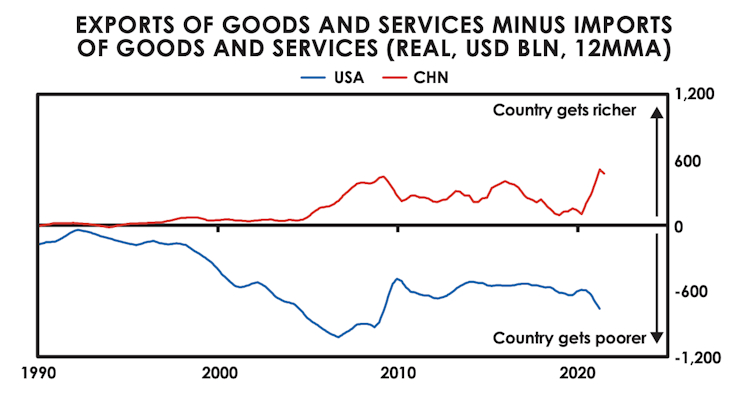
Without the pandemics and supply chain issues from 2020-early 2022, more businesses would want to dedicate more of their supply chains in China because China's supply chains are better than the supply chains of other countries. But because of the stress and issues with the supply chains during the pandemic along with rising tensions between China and Taiwan, companies are scrambling to get their manufacturing operations out of China. The withdrawal of manufacturing will cause China's trade surplus to decrease and possibly bring it to a deficit as other countries start producing goods for the rest of the world. These trends are increasing the likelihood that China falls into the middle income trap.
Dalio also mentions that the high levels of debt in the US economy, along with immense money printing, makes the US prone to even more decline. I mean, yes, since studying the Roman Empire and many other empires that existed since then, debt and money printing were contributors to the collapse of superpowers. But Dalio forgets to look at China's money printing and debt ratios too.
Incase you never knew, the Roman Empire decrease the purity of its silver coins to make more silver coins to pay for more public projects. That's how the Romans were able to "print their own money" (source)
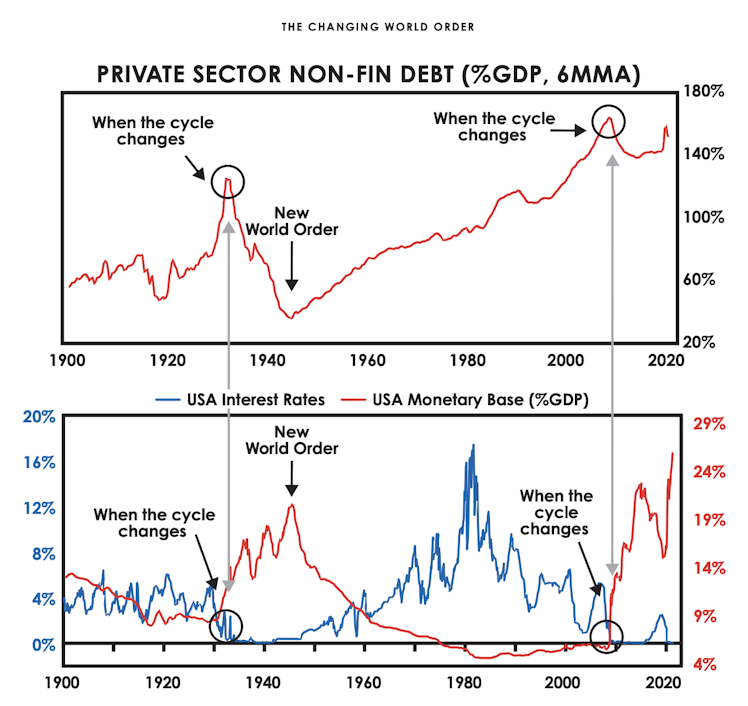
Money & Macro found that when comparing private debt/GDP and money supply/GDP, China's ratios are a lot worse than America's ratios. What's staggering is that even if China produces more goods than the US and continues to hold a growing trade surplus, the money supply as a share of GDP continues to grow. A healthy and growing economy would see their money supply as a share of GDP stagnate as central banks meet the demand for cash in the economy. In a way, China is printing more money than it needs to as a way to artificially boost GDP growth.
Meanwhile in the US, as much as Americans dislike the Fed, central banks have been better at meeting the demand for cash, which is why their money supply as a % of GDP remained consistent over a long period of time.
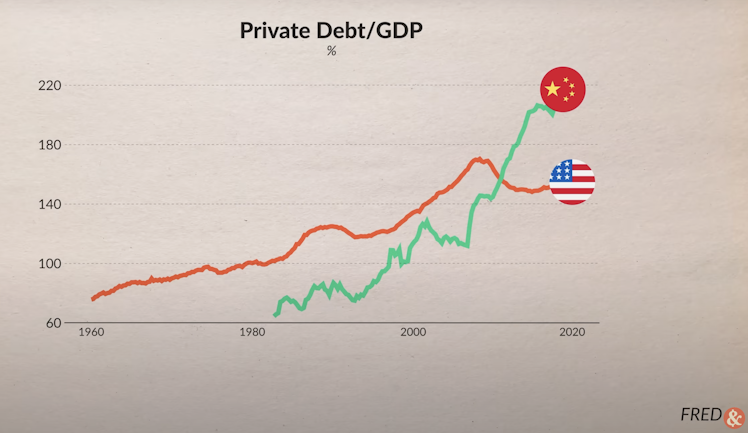
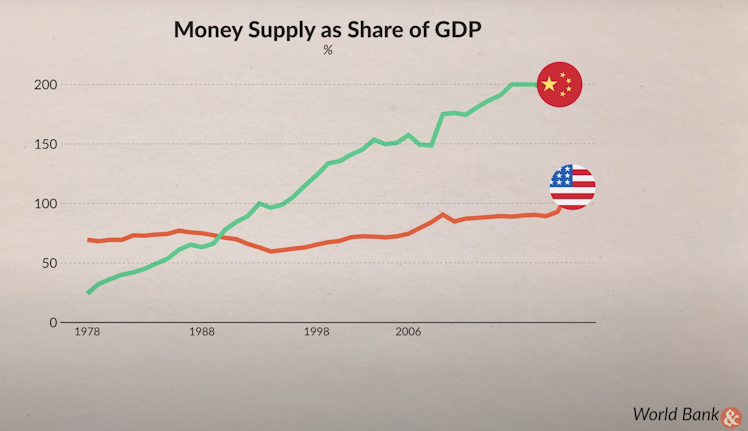
Now, what about inequality? Dalio finds wealth inequality in the US to be unusually. From my perspective, he made America's wealth inequality problem look a lot like South Africa, which has the worst inequality problem in the world.
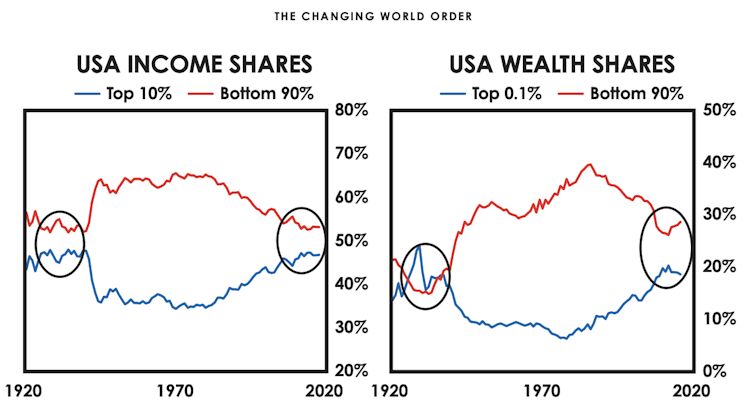
When comparing the US to China and other countries on wealth inequality, the US, China, and Japan all have similar inequality levels. India and South Africa have extreme inequality metrics. France has a lower inequality rate than the US and other nations. I don't think that the inequality argument that Dalio uses to convey that the US is a declining power and China is a rising power makes sense.
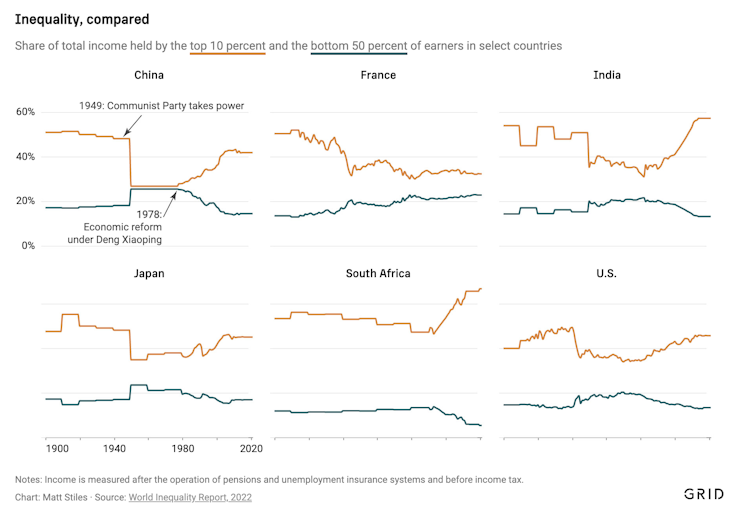
If Dalio is trying to link inequality to the growth in political polarization, I can understand why he might think that internal problems will exacerbate the decline of the American empire. However, when comparing America's political system to China's, it's unfair to say that America's crazier politics makes the case that the country as a whole is a declining power.
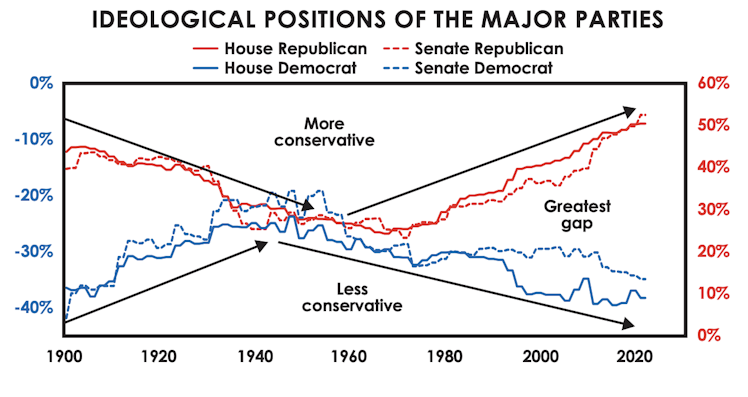
Consider the fact that China only has one political party, the Chinese Communist Party (CCP). China also restricts free speech and monitors its people in Orwellian fashion. Outsiders have a harder time seeing people getting mad at each other in China's governmental meetings because there's only one party and the way in which Party members interact with each other is heavily restricted. With protests outside banks, lockdown protests, and the Hong Kong protests of 2019, civilian discontent on the government is prevalent. Even if the Party might distract the people from their everyday problems by supporting Russia's invasion of Ukraine and beating the drums of war on its long awaited invasion of Taiwan, I doubt that their methods are working. It's probably why their cheers of Putin in Chinese State Media and the videos showing Chinese air force pilots seeing the mountains of Taiwan in their routine and illegal ADIZ flyovers continue to get louder.
As for education, even if China might be the leading producer of STEM graduates, more STEM grads don't guarantee more innovation. Sure, students in China are motivated to take harder subjects in school as their average years of schooling is much less than an American's average years of schooling, but it always seems like the bigger innovations happen in America. The mRNA vaccines, cloud computing, semiconductor designs, electric vehicles, etc. all came from America. China has always seemed to be the country that was more focused on either replicating America's tech or on mass producing the innovations from America to make them affordable for everyone globally.
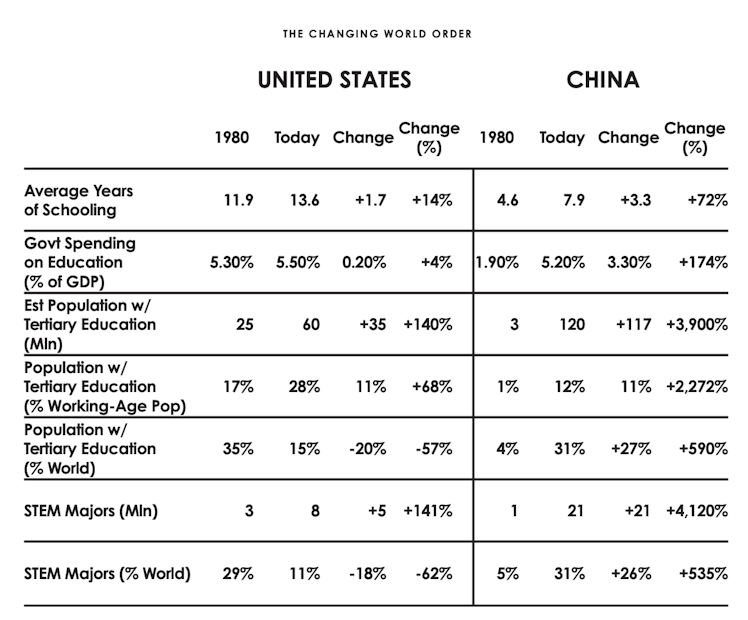
With the biotech and semiconductor sanctions from the Biden Administration in late 2022, the tens of millions of STEM graduates in China will have a harder time with innovating things because they've been blocked from having access to the latest technologies. Their work will dedicated to figuring out technologies of the today that the rest of the world have discovered and invented long ago as a result of the sanctions. The effects of the sanctions are small today as they were only recent. As time goes on, there will be a noticeable difference between the tech that America has and the tech that China has.
In summary, while Ray Dalio has identified flaws in the American empire that suggest a declining trajectory, it is important to note that similar flaws also exist in China. Although China's growing influence on the world may suggest it could become the next superpower, it is worth noting that the US has secured its strong influence through the creation of numerous international organizations that govern the world today. Also, China has a lot more to lose from putting itself in a position to receive Russia-style sanctions than the US has in placing those sanctions. From the recent behaviors that China has exhibited, it looks like China could join Russia and become isolated from the rest of the world.
NPR
China's authorities are quietly rounding up people who protested against COVID rules
Residents held vigils to commemorate people who have died in lockdown. Several have been arrested.
Already have an account?